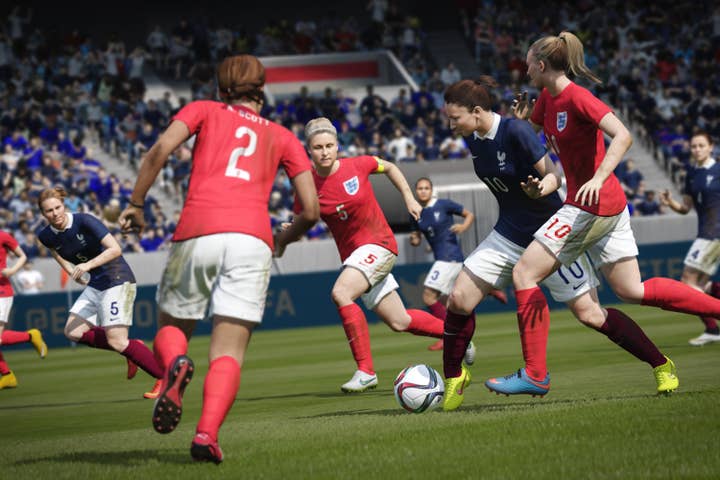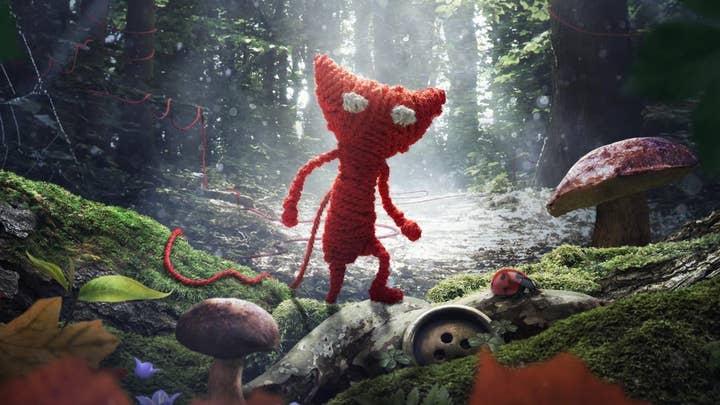EA's Moore: "A lot of publishers just throw stuff up against a wall"
The COO on how EA does new IP differently, bringing women to FIFA and the company's plans for VR
Peter Moore, COO of Electronic Arts, is one of the few big executives that isn't afraid to speak his mind. In interviews, on Twitter, even in our comments section, he can be relied on to step in and make himself heard when the situation calls for it.
At E3 he was true to form, keen to highlight EA's success with its major franchises but open about the mistakes it had made in the past with Medal of Honor and Battlefield. He also shared his executive level view of the decision to add women's teams to the FIFA franchise revealed how EA was approaching that whole virtual reality thing.
Need for Speed is sort of the poster child for this because after Rivals, we took a hard look and said, the genre was starting to struggle. Not like the old days of Gran Turismo, or when we built Forza when I was at Microsoft.
So the racing genre was huge, and then all of a sudden everything started to taper and we took a look at Need for Speed and we have a new studio that we decided to give it to, Ghost Studios. But then you just say, "You know what, it just needs some extra time."
It's the first year in 15 years that we hadn't shipped a Need for Speed, but we let everybody know, and as a public trading company we needed to let Wall Street know, and everybody gets it, and there's other stuff we can always sell to fill the hole. I think it's benefited enormously. It looks gorgeous.
"The big bad EA forces the game out before ... That's not what happens."
If it was just another Need for Speed, nitrous, speed strips, cops coming after you, fine. We'd sell some, but this needed an extra year, we're very happy with it.
It's actually from the studio. The studio will come, we sit down, we have what we call 'key franchise reviews', we have three, four year views of what our portfolio will be. We then sit down with the studio heads and say "Okay, what do you need?"
I know everybody thinks companies like us say "you must deliver the game!" That's not how it happens. The big bad EA forces the game out before...That's not what happens. The studios are in control, they know what their milestones are. If a studio says "Look, we just need the time," they need the time.
We've done that with golf, just recently, certainly did it with Battlefield Hardline last year. Nine times out of ten it's always for the benefit of the player. It's also for the benefit of the franchise, look at Battlefield Hardline. If we had forced it to come out in October and it was a bad experience, that's two strikes on that franchise because we were still reeling a little bit from Battlefield 4, which now is rock-solid and everybody's loving it.
A company like ourselves, that invests billions of dollars every year in building up the games, bringing the games to market, you've got to have a long-term plan. Those plans always change. I could sit here off the top of my head and tell you what's going to ship in FY 18, right now, as regards to the plan. Then I'd sit here in FY 18 and say, "Well now that didn't quite work out the way it is." That's just the way our industry is, but you have to have the discipline to say that if a game isn't going to make it, or if we have to give a game a year off if it's an annual game, that you just fill in with other stuff and make it all happen. That's who we are.

Medal of Honor, anybody?
You of think of some of the great franchises, when I got into it ... Tomb Raider owned everything, and then, I don't think they had a bad one, it just became less relevant. And it became too sexist maybe, I don't know.
Gran Turismo: they forgot to ship it for a while, we all got out of the way of Gran Turismo. That's the ebbs and flows of this industry. It's why companies like Disney are brilliant in keeping IP fresh for generation after generation. Mickey Mouse, who hasn't been in a movie for 80 years, everybody still knows Mickey Mouse and what you do is you somehow make it relevant for every generation and we do it very well, it's the 27th year of Madden NFL, 27 years coming up.
When you look at new IP, it's got to be IP that can't be watered-down; it's got to be something you can build upon. Sims is probably one of the best examples of that, where not only does the game grow over the years, the game you ship and then the expansion packs. You think about everything you do and it's four or five years later which is a little bit of a challenge then when you ship a new one, because Sims 3 players going "Wait a second."
"When you look at new IP, it's got to be IP that can't be watered-down; it's got to be something you can build upon"
"I got all this stuff," and they forget, "well it's taken me years, to accumulate this." Then you ship Sims 4 - now we just did the expansion pack and everything's starting to feel good about Sims 4 now - but it takes a long time to do that and we always totally underestimate that when we ship a Sims game. You forget what most people now are living with.
Everything! They're on their fifth relationship! The Sims players...They're a hard-core bunch, a very hard-core bunch.
Toddlers and swimming pools! Think of that and all the furore that was.
New IP is a little bit of a challenge because you've got to build it and the gamer has to have patience that the first one is kind of putting a stake in the ground. Mass Effect, the first one was exclusive on Xbox 360 and then it grows and then that opening video is the sum of three previous Mass Effects and when N7 comes on there and the little tingle goes up your spine. That doesn't come overnight. That takes decades, and we've learned that.
New IP is great and that's why you do something like an Unravel, where can we go with that, Plants vs Zombies, how do you take that from being a game on a phone? All of a sudden, let's make a shooter out of this, completely different game mechanic but using the IP in a very different and innovative way and it's been very successful. For every one of those there's a Dawngate, which didn't quite get it done.
We're lucky. We're a lot more fastidious and organized. A lot of publishers just throw stuff up against a wall and hope it sticks. We're very driven by the gut, driven by experience, we've been in this business 35 years, we kind of have a feel for what works, and we talk to players much earlier. Our game changers come in, we listen to them, almost, well not almost, pre-alpha. Once we get through what we call "Gate Zero" which is right, we're ready to show you a prototype, that's when we bring gamers in. Usability testing, all that stuff.

The only tweet that I could re-tweet was that asshole who just said, "Well I'm not playing it," a Brit, and the other stuff I wasn't going to re-tweet and "Where's the boob simulator?" Why do they even type this stuff?
It took us a long time, it took us a couple of years, we need to get all of the players into Vancouver to do motion-cap. The way that the woman's body moves, you just weren't going to put a woman's head on a man's body.
Yeah, I mean there's a different articulation of movement that women, when you watch a women's game it's different. Can I tell you why it's different? No, but I just know I'm watching women. It's only on the motion capture, and where you capture the data, that you figure out what it is and our motion-cap guys would tell you something about the movement of the hips and all this stuff, I won't get into it. Then you need to face down the Alex Morgans, the Abby Wambachs, bring the Brazilians in, bring the Swedes in, bring the Portuguese in. It takes a lot of time and effort. You also need a marketing platform, and the Women's World Cup is that marketing platform, and it all came together nicely for us.
"A lot of publishers just throw stuff up against a wall and hope it sticks"
Great question. Team's got the kits. Teams are looking at it, all around the world, interested. We've got to build a game from the ground up, it's not just "Let's take that PS4 game and make it Project Morpheus," or "Take that Xbox One game and make it Hololens." Like any great game, it's got to be the killer app, if you will, so we're looking at that.
You might imagine all the studios are messing around with it. Sports could be huge, but you've got to get it right. When it's ready I think we'll be ready. Still a lot of questions to be asked, price points and consumer reaction. One hundredth of tenth of the population has actually seen one, you've got to actually put it on, and that's also a challenge, and you've got to lose the nerd factor of wearing it. There's a lot of people that get disoriented, you've got to get that right.
I think it's exciting ... I was a few weeks up in Seattle at Microsoft, and did HoloLens and it's bigger than games.. I was transported into the Colosseum in Rome, put it on, I'd never been to the Colosseum, but I've been to the Colosseum now. I've watched gladiators in front of me and I've turned around and those gladiators disappeared and modern-day Rome was there. Games will be an important part, but it's going to be much bigger than that.

